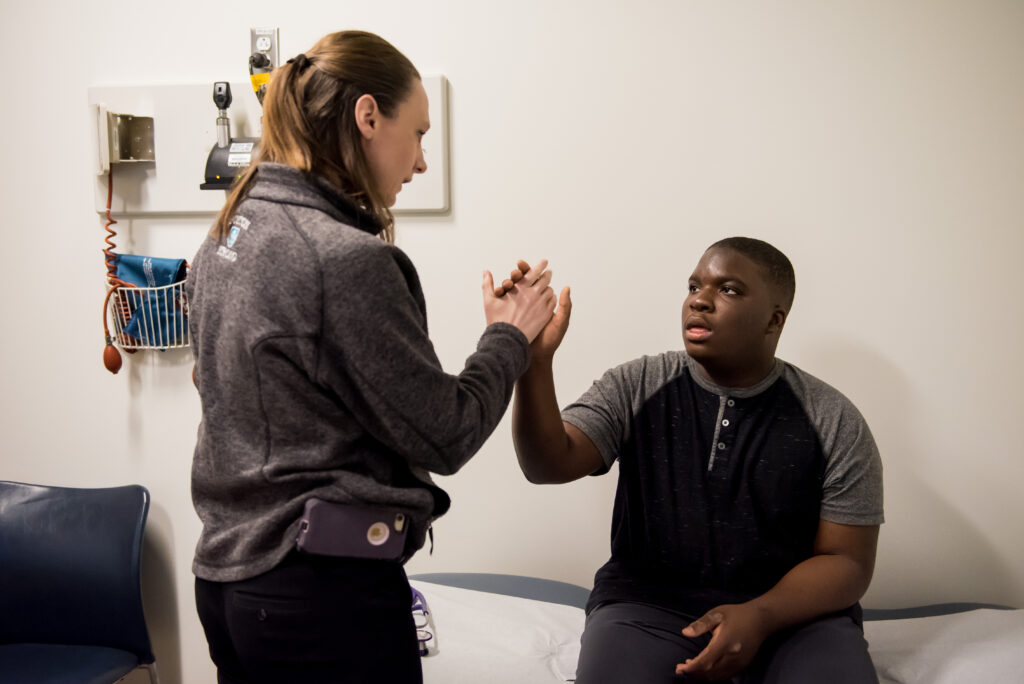Nicole Simon, EdM, LABA, BCBA, senior behavioral consultant at the Lurie Center for Autism, provides applied behavior analysis (ABA) based services for patients of all ages and their families. In her role at the Lurie Center for Autism, Ms. Simon provides second opinions, short-term intervention models, program assessments and consultations to schools, family homes and residential programs. In collaboration with Lisa Nowinski, PhD, Ms. Simon also leads a ground-breaking research initiative designed to teach parents how to de-escalate and physically manage aggressive behaviors utilizing the Crisis Prevention Institute (CPI™) model. We recently interviewed Ms. Simon about her role at the Lurie Center.
As a behavioral consultant, what is your role at the Lurie Center?
I provide consultation on specific behavioral challenges that a patient may be experiencing and on overall programming or services that a patient is receiving. And I teach families and staff about applied behavior analysis (ABA) and its important role in the treatment of autism spectrum disorder (ASD). I conduct research to help parents feel better equipped to manage challenging behaviors at home, and lead the Lurie Center safety team which aims to help our patients and families have a safe and welcoming experience at our center.
What is ABA? Why is it commonly recommended for patients with ASD?
Applied behavior analysis is the science of human behavior. ABA uses behavioral principles in real world settings like schools and homes to address socially significant issues such as communication, behavior and play. ABA often includes assessment, a behavior plan and data collection to help monitor the plan. As the number one evidence-based treatment for autism, ABA is most effective at treating challenging behaviors and building skills. The behavioral principles apply to all of us. There are many different teaching methodologies that fall under the umbrella of ABA.

If you had one tip for families of children with newly diagnosed ASD, what would it be?
Start early with good comprehensive ABA services. Starting early will help to achieve the best outcomes.
What should families think about when starting with ABA?
The specialist who conducts the initial evaluation and develops/monitors the treatment plan should be a board-certified behavior analyst (BCBA) with experience in autism. The teachers or staff members carrying out the plan need to be trained in the principles of ABA and supervised by a BCBA. It is important to remember that as in other professions, there will be some BCBA clinicians who are better than others. If you have concerns about the programming or recommendations, try a new provider or seek a second opinion. Do not abandon the treatment modality just because you are questioning the quality of the services that are being provided.
How do families avoid getting overwhelmed with the data collection that is commonly recommended by ABA specialists?
In a clinical setting it is a lot easier to expect high levels of complex data collection. However, at home parents find it much more challenging to collect data given their many competing responsibilities. There are a variety of ways in which simplified data collection can be used by parents. Think about limiting the number of behaviors being tracked and tracking them on a calendar or a smartphone instead of a binder filled with data sheets. Parents should feel comfortable telling a provider if the data being requested is not reasonable and finding an alternative that works.
“ABA uses behavioral principles in real world settings like schools and homes to address socially significant issues.”
How do you best share the ABA data when meeting with the doctor?
Once you develop a data collection system that is easy to use, it is helpful to share the data with your school team and medical providers. When collecting and sharing data with a clinician, you should be focused on the two or three most concerning behaviors. If working with an ABA specialist, you can request copies of behavioral graphs to share more quickly during an appointment with a provider.
We have been focused on children; what about individuals with autism who are 22 or older?
When a child turns 22, the access to funding and resources significantly decreases and often the quality of available services declines. The challenge is to find appropriate supports whether it be at a program, in the community or in the home. We want to help the adult gain independent living skills, access the community and maintain a high quality of life.
Can ABA work for adults?
While we encourage ABA services to start early, that doesn’t mean that ABA doesn’t work for individuals that are older. Behavior that has been learned can be changed at any age. However, the change process may be met with more resistance and might take longer. The goals for an adult with autism may surround integrating into a vocational or community setting, becoming more independent with self-care routines, tolerating family gatherings, and participating in meaningful and healthy daily activities such as exercise and social opportunities. Many adults with ASD still have interfering behaviors that need to be addressed.
What do you like best about your role at the Lurie Center?
I really like seeing patients of all ages — children and adults — across the spectrum, from around the world. Each patient or situation brings a unique challenge. I love the opportunity to both teach and collaborate with families and colleagues.
For more information on how to support the Lurie Center for Autism, please contact us.


